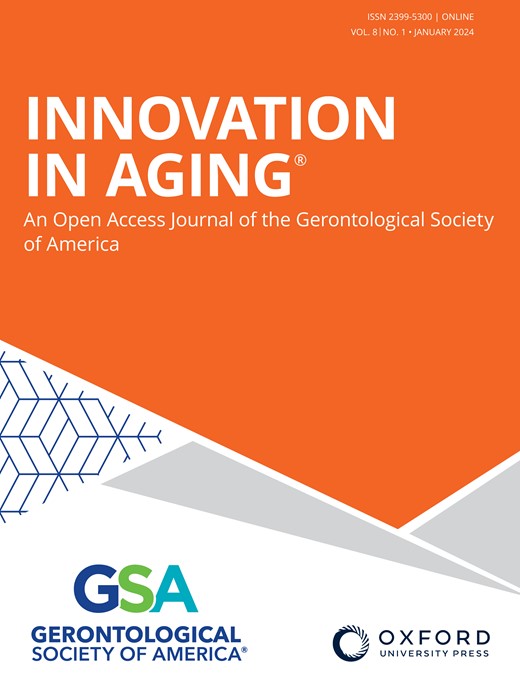THE STRONGERMEMORY PROGRAM: EXPLORING COGNITIVE BENEFITS AND FOSTERING COMMUNITY
IF 4.3
3区 医学
Q1 GERIATRICS & GERONTOLOGY
引用次数: 0
Abstract
Abstract Background StrongerMemory is a brain health program centered on spending 30 minutes per day on handwritten journaling, reading aloud, and arithmetic exercises as a method to enhance cognition in older adults. The StrongerMemory research protocol is a 12-week program that includes a weekly meeting. After 104 participants completed the StrongerMemory research protocol, they were invited to participate in a focus group to share their experiences. Six focus groups were conducted by members of the StrongerMemory research team yielding 30 participants. Methods Focus groups were conducted virtually, with a set of pre-determined, open-ended questions centering around participant experiences and attitudes towards the StrongerMemory program. Participants were also asked to reflect on differences in their memory, cognition and well-being before and after StrongerMemory participation. Two researchers independently coded the focus group transcripts, and utilized the grounded theory analysis techniques of memoing and constant comparative analysis to explore the data. Common themes were then discussed. Results Five overarching themes emerged: Motivating, appreciating, challenging, committing, and enhancing. Conceptualizations of these themes focused on participants’ experiences and suggestions for strengthening the program. “Fostering community” was an outcome of the program often discussed. Conclusion The participant experience in StrongerMemory revealed unique perspectives on their motivation for participation and provided the researchers with new insights into the program such as fostering community within older adult groups. Further research includes exploring cognitive and social benefits of group participation in the StrongerMemory program.强化记忆计划:探索认知益处,促进社区发展
摘要 背景 StrongerMemory 是一项脑健康计划,其核心是每天花 30 分钟手写日记、朗读和算术练习,以此来提高老年人的认知能力。StrongerMemory 研究计划为期 12 周,包括每周一次的会议。104 名参与者完成 "强化记忆 "研究方案后,受邀参加焦点小组,分享他们的经验。StrongerMemory 研究小组的成员主持了六个焦点小组,共有 30 人参加。方法 焦点小组以虚拟方式进行,围绕参与者的经历和对强记忆计划的态度提出一组预先确定的开放式问题。参与者还被要求反思他们在参加 StrongerMemory 计划前后在记忆、认知和幸福感方面的差异。两名研究人员对焦点小组的记录进行了独立编码,并利用基础理论分析技术(备忘录分析和恒定比较分析)对数据进行了探讨。然后对共同主题进行了讨论。结果 出现了五大主题:激励、欣赏、挑战、承诺和提高。这些主题的概念化侧重于参与者的经验和对加强计划的建议。"促进社区发展 "是经常讨论的一项计划成果。结论 参与者在 "强化记忆 "计划中的经历揭示了他们对参与动机的独特看法,并为研究人员提供了对该计划的新见解,如在老年人群体中培养社区意识。进一步的研究包括探索集体参与 "强化记忆 "计划对认知和社会的益处。
本文章由计算机程序翻译,如有差异,请以英文原文为准。
求助全文
约1分钟内获得全文
求助全文
来源期刊

Innovation in Aging
GERIATRICS & GERONTOLOGY-
CiteScore
4.10
自引率
0.00%
发文量
72
审稿时长
15 weeks
期刊介绍:
Innovation in Aging, an interdisciplinary Open Access journal of the Gerontological Society of America (GSA), is dedicated to publishing innovative, conceptually robust, and methodologically rigorous research focused on aging and the life course. The journal aims to present studies with the potential to significantly enhance the health, functionality, and overall well-being of older adults by translating scientific insights into practical applications. Research published in the journal spans a variety of settings, including community, clinical, and laboratory contexts, with a clear emphasis on issues that are directly pertinent to aging and the dynamics of life over time. The content of the journal mirrors the diverse research interests of GSA members and encompasses a range of study types. These include the validation of new conceptual or theoretical models, assessments of factors impacting the health and well-being of older adults, evaluations of interventions and policies, the implementation of groundbreaking research methodologies, interdisciplinary research that adapts concepts and methods from other fields to aging studies, and the use of modeling and simulations to understand factors and processes influencing aging outcomes. The journal welcomes contributions from scholars across various disciplines, such as technology, engineering, architecture, economics, business, law, political science, public policy, education, public health, social and psychological sciences, biomedical and health sciences, and the humanities and arts, reflecting a holistic approach to advancing knowledge in gerontology.
 求助内容:
求助内容: 应助结果提醒方式:
应助结果提醒方式:


